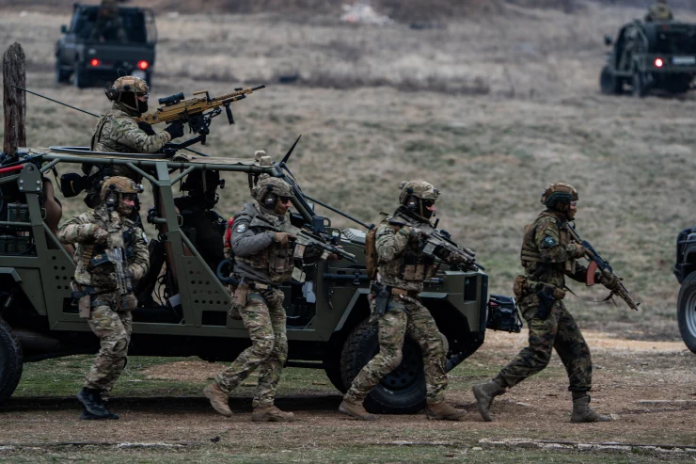European leaders clashed over the possibility of deploying troops to Ukraine during a crisis meeting in Paris on Monday, according to The Financial Times.
The meeting aimed at forging a unified response to US President Donald Trump’s peace talks with Russia. The event, hosted by French President Emmanuel Macron, brought together leaders from six EU countries, the UK, and officials from NATO and the EU.
The discussions focused on how to support Ukraine and boost European defence spending in light of Trump’s unexpected announcement of peace talks with Russia.
European response
France proposed the creation of a “reassurance force” that would be stationed behind a potential ceasefire line in Ukraine, rather than directly on the frontlines. Macron, who spoke with Trump before and after the summit, stressed the importance of European unity and continued consultation with both the US and Ukraine.
We want a solid and durable peace in Ukraine. We will work with all the Europeans, the Americans and the Ukrainians. This is the key.
German Chancellor Olaf Scholz, who faces national elections on Sunday, called the discussion about troop deployments “highly inappropriate” given the ongoing conflict.
The discussion is completely premature, and it is the wrong time to have it.
Italian Prime Minister Giorgia Meloni also expressed hesitation, describing the deployment of European troops as “the most complex and least likely to be effective” option, according to sources familiar with her remarks.
In contrast, UK Prime Minister Keir Starmer stated that he was “prepared to consider committing British forces on the ground alongside others if there is a lasting peace agreement.” However, he emphasised that any such commitment would require a US security guarantee. Starmer confirmed plans to meet Trump in Washington next week for further discussions.
There must be a US backstop. A US security guarantee is the only effective way to deter Russia from attacking Ukraine again.
Mixed reactions from other European leaders
While the UK expressed openness to deploying troops, other countries remained cautious. Danish Prime Minister Mette Frederiksen said she was “open to discussing many different things,” including troop deployments, but stressed the need for clarity on the safety of personnel.
Spanish Foreign Minister José Manuel Albares, for his part, ruled out the possibility of sending in European forces.
Nobody is currently considering sending troops to Ukraine.
Poland, despite its hawkish stance on defending Europe from Russia and its increased defence spending since the war broke out, also rejected the idea of sending troops. Prime Minister Donald Tusk downplayed the divisions at the meeting, highlighting a shared recognition of the need to bolster European militaries.
There was agreement and unanimity that a significant increase in defence spending is absolutely necessary.
Bulgaria’s President Rumen Radev has also strongly rejected any possibility of sending Bulgarian troops to Ukraine.
I expect the government and the National Assembly to state a clear and unambiguous position that Bulgaria will not send troops.
Funding European defence
The Paris meeting also explored ways to fund enhanced European defence capabilities, including joint borrowing or other “innovative financing” methods. Macron advocated for EU-wide borrowing to reduce reliance on US troops and weaponry, though Germany and the Netherlands had opposed such measures.
European Commission President Ursula von der Leyen proposed temporarily easing EU deficit rules to allow higher defence spending, an idea supported by Scholz, who endorsed an “escape clause” but stopped short of backing common borrowing.
As European leaders grapple with the complexities of the Ukraine crisis, the divisions over troop deployments underscore the challenges of achieving a unified response while balancing national interests and the need for collective security.
